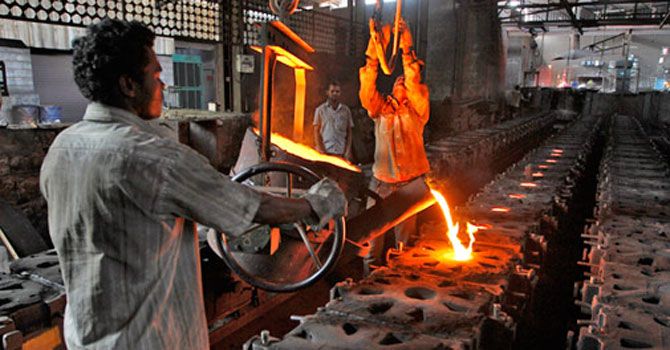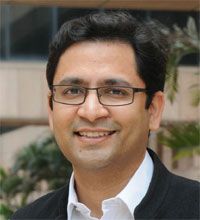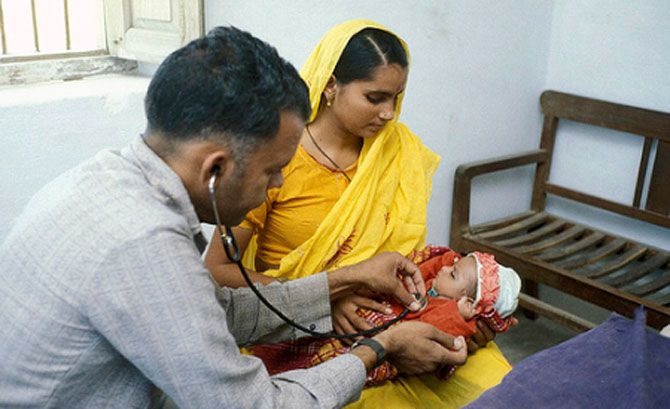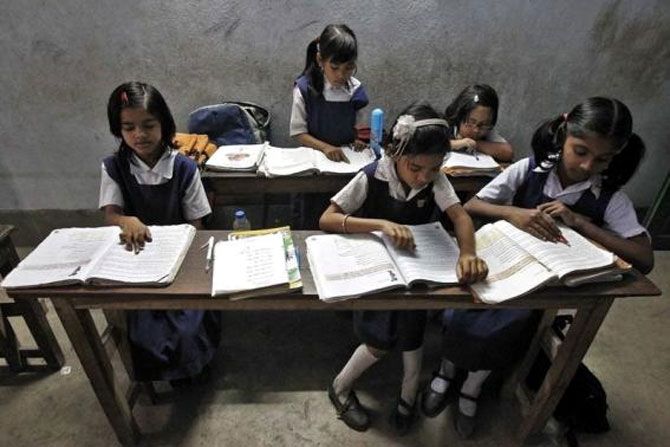'If you want manufacturing to flourish and if you are aiming at sustainable growth, high school education is a must'
'The highest turnover from economic investment comes when you invest in younger people'

Investment by the government in secondary schools is very important for the economic growth of the country, said Tarun Jain (bottom, left), assistant professor of economics at the Indian School of Business, Hyderabad.
He received his undergraduate degree in Mathematics and Economics from Franklin and Marshall College and PhD from the University of Virginia.
 In an interview to Shobha Warrier/Rediff.com, Jain talks about what the Narendra Modi government must do to achieve 8 per cent growth.
In an interview to Shobha Warrier/Rediff.com, Jain talks about what the Narendra Modi government must do to achieve 8 per cent growth.
What should the Modi government do to achieve eight per cent growth?
I want to talk about some very basic aspects that a country has to focus on to achieve growth.
First is healthcare. Unlike China, which gets older everyday, the demography of India shows it is getting younger and younger. So we have to think how we can improve the income of everyone and with that welfare too.
We have to first think of the highly educated and highly motivated young generation who can be the engines of growth. But if they are unproductive and demotivated, it is not good for the country.
So, we should invest first in early childhood. The highest turnover from economic investment comes when you invest in younger people. You have to think of them even before they are born.
The cost of iron supplements for a mother is very little but the returns are humongous when you look at the health of the children.

There was a time when Kerala boasted of efficient primary health centres run by the State. Today not just in Kerala, but pan-India too, healthcare is in the hands of the private sector. Do you feel it is the duty of the State to take care of the health of its people?
Absolutely. That is exactly what I mean. Taking care of the health of its people is the best investment for a country. Whatever be the policy of the government or the model it adopts, it has to be in the direction to provide better healthcare to its citizens, especially maternal health and the health of small children. It all starts with children being born with deficiency in iron supplements.
The next important thing India has to concentrate on is, eradicating communicable diseases. The biggest achievement of India is eradicating polio. Compare the economic condition of the person affected with polio and the one unaffected by polio. The latter is more productive. Cost of sanitation, which reduces malaria, cholera, etc, is relatively low compared to the ravages of the diseases.
Then comes education.

The criticism is that even today, children in underdeveloped states drop out of schools…
I don’t think access to primary education is an issue now. India has almost covered primary school children but what is worrying is the quality of education. We have to have a better curriculum and better teachers. It is necessary to highlight the need for qualified and motivated teachers.
But there is no universal enrolment in secondary schools and children drop out by the time they reach secondary schools. This will result in not having enough trained workforce. For example, to make the PM’s Make in India campaign a success, you need trained labour force. That is why I say, investment by the government in secondary schools is very important for the economic growth of the country.
People who are engaged in manufacturing also need educated workers.
One of the important things countries like the Asian Tigers did was invest in primary and secondary school systems. There is no poverty in the East Asian countries and these were the nations that suffered the most after the Second World War. Those societies were ravished by the war then. China also is investing heavily in university education after achieving universal primary education 30 years ago.
The other great example is the United States, which in the early 20th century became the first country in the world to have universal high school. If you want manufacturing to flourish and if you are aiming at sustainable growth, high school education is a must.
How do you describe Indian workforce?
Women comprises half of India’s labour force. Their education is increasing but the desire to work is decreasing. So, we have half our work force sitting idle or moving in the wrong direction. How do we ensure that women are able to work in a productive manner in the manufacturing facilities? The attitude has to change for educated women to work in factories.

Will India ever be able to match China’s dominance in manufacturing?
China has infrastructure and educated labour force. It invested substantially in primary and secondary education system, something that India, unfortunately, has not.
The other issue is environmental regulations. In India, we think environmental regulations stifle manufacturing. If you have cleaner air and cleaner water, you will have more productive workers who fall sick less often. Environmental regulations are, thus, good from the perspective of the industry. South Korea used to be among the most polluted in the '70s and the '80s but, now, it is among the cleanest countries in the world.
Which sector should the government concentrate on to achieve eight pc economic growth?
In my opinion, if the government invests in primary and secondary education, healthcare and environment, we don’t need to worry about which sector will help economic growth. If we concentrate on infrastructure and environmental investments, workforce participation, early childhood health, primary and secondary education, women’s labour participation, we can achieve growth.
We are a country of more than a billion people and we can grow in all the sectors.
What we need is sustainable growth and not high, short-term growth. Sustainable growth happens only when you have healthy people and if you invest in the health of people, they will be productive for 30-40 years. If you invest in children’s education, they will have 40-50 years of productive lifetime.










